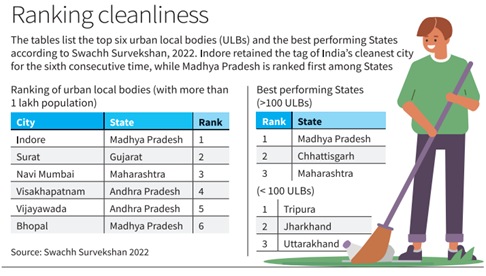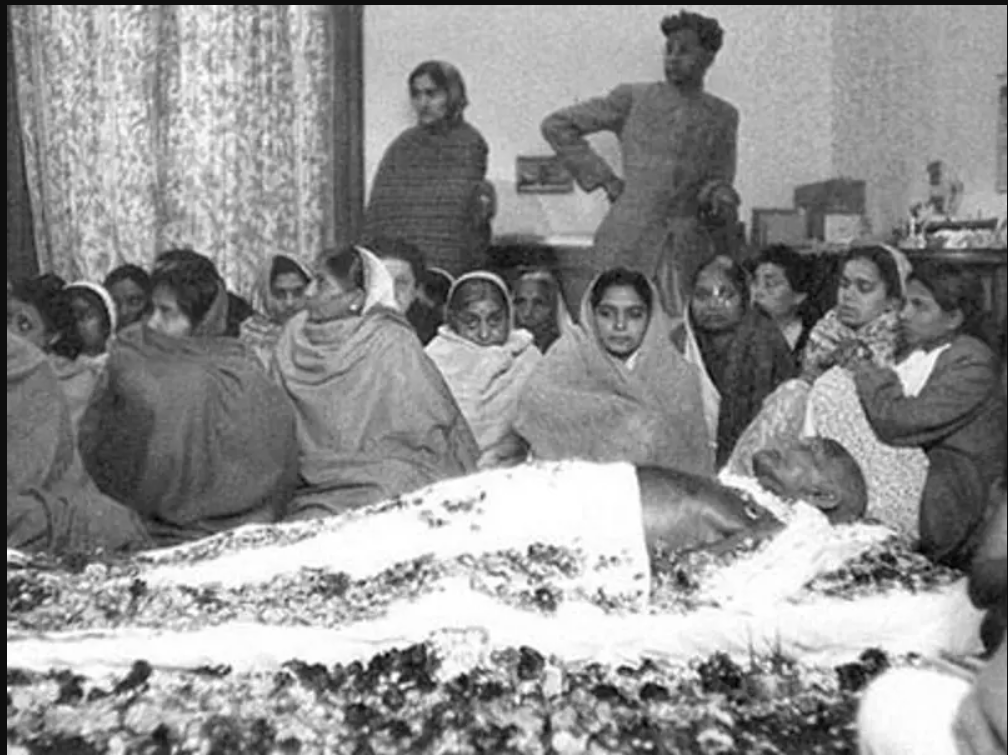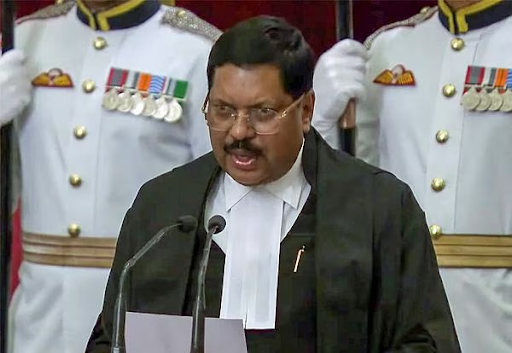Description

Copyright infringement not intended
In News
- Indore is the cleanest city in India, while Madhya Pradesh is the cleanest State in the country.
- Surat (Gujarat) is the 2nd cleanest city.
- Chhattisgarh is the 2nd cleanest State.
- Tirupati received the best city award in the Safai Mitra Suraksha category.
- Haridwar (Uttarakhand) received the best Ganga town award in more than one lakh population cities categories.

Details
- The field assessment for Swachh Survekshan was launched on 1st March 2022 by the Ministry of Housing and Urban Affairs (MoHUA).
- Swachh Survekshan 2022 is targeted toward capturing the initiatives of cities for the overall welfare and well-being of Sanitation workers.
- This year another new indicator ‘Swachh Technology Challenge’ has been added.
- To expand the Survekshan footprint, district rankings have been introduced.
- The scope of the survey has been expanded to now cover 100% of wards, as compared to 40% in previous years.
Swachh Survekshan
- Swachh Survekshan was initiated by the Ministry of Housing and Urban Affairs in 2016 as a competitive framework to encourage cities to improve the status of urban sanitation.
- Swachh Survekshans are conducted under the Swachh Bharat Mission (Urban).
- It has promoted a spirit of healthy competition among cities and towns of India.
- The Primary goal of Swachh Survekshans is to encourage large-scale citizen participation and create awareness amongst all sections of society about the importance of working together towards making towns and cities better places to reside in.
- The performance of each city is evaluated on six parameters:
- Municipal solid waste, sweeping, collection and transportation.
- Municipal solid waste, processing, and disposal of solid waste.
- Open defecation free and toilets.
- Capacity building and e-Learning.
- Provision of public toilets and community toilets.
- Information, education and communication, and behaviour change.
Swachh Bharat Mission
- Swachh Bharat Mission (SBM) is a country-wide campaign initiated by the Government of India in 2014 to eliminate open defecation and improve solid waste management.
- It is a restructured version of the Nirmal Bharat Abhiyan launched in 2009.
- Phase 1 of the Swachh Bharat Mission lasted till October 2019.
- Phase 2 is being implemented between 2020–21 and 2024–25.
- The mission aimed to achieve an "open-defecation free" (ODF) India by 2nd October 2019, the 150th anniversary of the birth of Mahatma Gandhi through the construction of toilets.
- The objectives of the first phase of the mission:
- Eradication of manual scavenging.
- Generating awareness and bringing about a behaviour change regarding sanitation practices.
- Building capacity at the local level.
- The second phase of the mission aims to sustain the open defecation-free status and improve the management of solid and liquid waste, while also working to improve the lives of sanitation workers.
- Under the scheme, the Government provides subsidies for constructing toilets, waste management structures, and awareness campaigns to bring behaviour change.
- The campaign is financed by the Government of India and state governments.
- The mission is split into two: Rural and Urban.
- In rural areas "SBM – Gramin is financed and monitored through the Ministry of Jal Shakti.
- In Urban areas "SBM - Urban is overseen by the Ministry of Housing and Urban Affairs.
Present Status
- According to the dashboards maintained by ministries, more than 100 million individual household-level toilets have been constructed in rural areas and 6 million household toilets in urban areas.
- Nearly 6 million community and public toilets have also been constructed in the urban areas.
- More than 4,200 cities and more than 600,000 villages across the country have declared themselves open defecation-free (ODF).
- More than 81.5 thousand wards in urban areas now have 100% door-to-door collection of solid waste and nearly 65 thousand wards practice 100% segregation of waste at source.
- According to UNICEF, the number of people without a toilet has been reduced from 550 million to 50 million.
- The World Bank reports that 96% of Indians who have a toilet use it.
- A study concluded that the construction of toilets under the program led to a reduction in the incidence of sexual assault against women.
https://epaper.thehindu.com/Home/ShareArticle?OrgId=G25ABLH25.1&imageview=0
https://t.me/+hJqMV1O0se03Njk9














